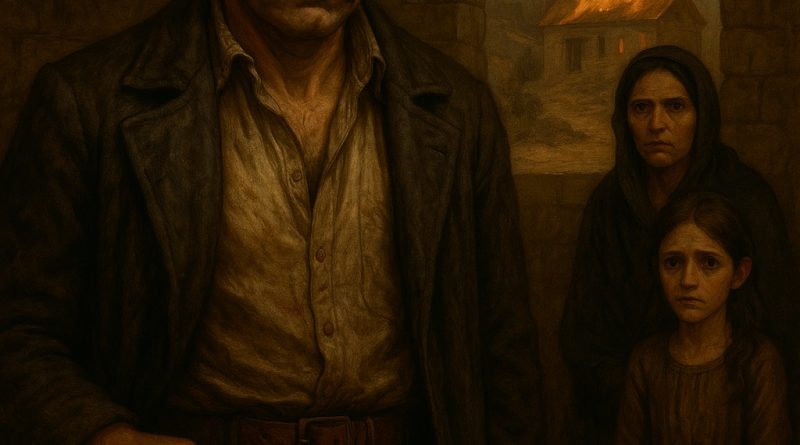In Thy Image
Florina, 1949
The stone house sat high above the village, its narrow windows like gun slits, cold and watchful. Beneath it, smoke still clung to the trees where the last reprisal had taken place—blackened wood, scorched earth, the faint smell of burned fabric and hair.
Konstantinos Zolis stood at the threshold, boots muddy, blood on his cuffs, his Luger still warm in its holster. He had left the bodies where they fell. One had been a child.
He entered his home without removing his coat. His wife, Anastassia, glanced up from her needlework. Their six-year-old daughter, Eleni, froze, her fingers sticky with a honey biscuit.
Konstantinos’s eyes were glassy and red-rimmed. Not from drink—he barely drank—but from something colder, more distilled.
“I want a son,” he said.
Anastassia tensed. “You have a daughter.”
He stepped forward. “I said, I want a son.”
She understood what that meant. She had seen what he did to others who disobeyed. In the next room, Eleni trembled behind the stove.
The Exodus, 1950
By autumn, the war had mostly ended. The communists were in flight or buried beneath unnamed stones. But enemies remained—quiet ones, inside his own camp. Some of his men had taken to whispering at night. One vanished. Another left for Thessaloniki without a word.
Konstantinos knew the signs. He had taught others how to read them before pulling their fingernails out.
And so, he ran.
His name—Zolis—meant too much to too many. He took the train to Athens, then to Piraeus. From there, a steamer to Halifax, then west to Toronto. He entered Canada under false papers with a letter of recommendation from an Orthodox priest who owed him a favor.
He left behind Anastassia, pregnant, and Eleni, now seven. He didn’t ask if they had enough money. He didn’t write.
February 1950
The boy was born in Florina during a bleak winter thaw, just months after the bloodshed had ceased. They named him Georgios Christos Zolis, though his father was already gone.
Konstantinos had vanished months earlier.. But his reach had not withered. Loyalists remained—mayors, police, former collaborators—men who still remembered whose boots they once kissed.
Letters came first. Then threats. Then men. Anastassia, barely recovered from childbirth, was given no real choice. With her newborn son and her daughter Eleni in tow, she was ordered to leave the village.
They moved in stages: first to Athens under escort, then to Canada by ship. Within a year, they reached Ohio, where Konstantinos—now calling himself Zoley, his name blunted for American ears—was waiting. Not to greet them with warmth, but to gather the pieces of the life he believed he had forged by force.
Transformation
Konstantinos worked odd jobs briefly. But his real skill—organization through fear—didn’t stay dormant long. By the early 1960s, he had started a “security consultancy” with other Greek and Balkan expats. By the ’70s, he was wealthy. Rumors circled. Union-breaking. Surveillance. Holding cells. But nothing stuck.
He did not speak to his daughter. She married young and vanished.
But his son—George—he groomed. Sent him to the best schools. Beat him for poor grades. Taught him how to look people in the eye and not blink.
“You are the future,” he told him once. “Do not forget the blood that built your world.”
Konstantinos died in 2014. The obituary listed him as a “community leader” and “entrepreneur.”
May 2025
George Zoley stands atop a glass tower in Boca Raton, Florida.
He oversees a vast empire of prison labor, immigrant detention, and surveillance contracts. Men are caged for profit. Families are broken. Executives speak of quarterly earnings while people in jumpsuits clean toilets for pennies.
His company’s origin story is sanitized. No mention of Florina. No mention of children burned alive, women raped, men shot through the mouth.
But in every cell locked, in every meal denied, in every dollar squeezed from suffering, Konstantinos Zolis lives on—not as a ghost, but as a blueprint.
George never speaks of his father. He doesn’t have to. Every action is a tribute. Every quarterly report is a blood offering.
The inheritance was never about land or gold.
It was the license to dehumanize—and the will to do it without remorse.

